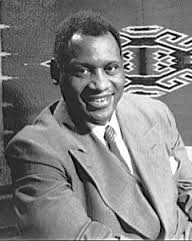

On this day in Labor History the year was 1949.
That was the day known in New York as the Peekskill Riots.
Internationally renowned African American Paul Robeson was scheduled to give an open-air concert.
He was known for his deep, moving voice singing iconic songs like Shenandoah and the Ballad of Joe Hill.
Robeson was active in the causes of civil and labor rights.
In the Cold War hysteria after World War II, Robeson had been labeled a dangerous Communist.
The New York concert was originally planned to benefit the Civil Rights Congress.
The group had been defending the “Trenton 6” a group of six black young men sentenced to die in New Jersey for allegedly killing a white shop keeper.
The case was rife with legal abuses.
But protests over the concert led to its cancellation.
It was rescheduled, and the tickets were distributed to trade unionists in New York City.
On the day of the concert 2,500 union members made a human wall around the field to protect against protesters.
Protesters gathered hurling anti-black and anti-Jewish racial epithets.
Pete Seeger opened the concert followed by Robeson.
The real trouble came when the concert ended and people tried to leave.
The protesters threw rocks at the passing cars, while policeman stood by and watched.
145 people were injured.
Other concerts were cancelled.
Paul Robeson would continue to be harassed by the FBI.
He was denied a passport due to his stance against anti-black discrimination in the United States and against colonialism in Africa.
More Episodes
All Episodes>>You may also like
Create Your Podcast In Minutes
- Full-featured podcast site
- Unlimited storage and bandwidth
- Comprehensive podcast stats
- Distribute to Apple Podcasts, Spotify, and more
- Make money with your podcast











